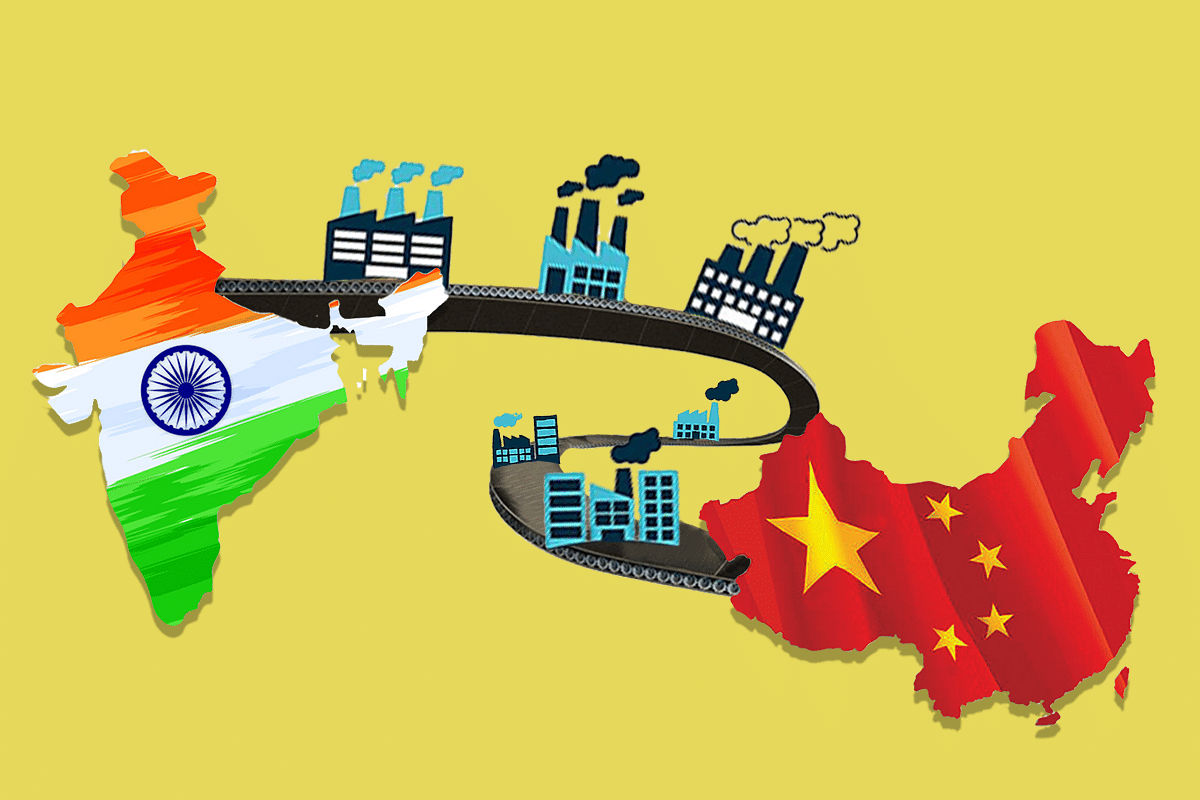News Brief
Post-Coronavirus India May Gain From The Exodus Of Manufacturing Units From China As Global Firms Look To Strengthen Supply Chains
- As global manufacturing companies operating in China look for a more stable business environment, India is best placed to host them.

Maps of India and China (Swarajya Magazine)
The outbreak of coronavirus (Covid-19) across the world has speeded up the exodus of manufacturing units from China that began sometime last year during Beijing’s trade war with the US.
A Business Today report, quoting top government sources, said that about 1,000 companies from abroad are holding discussions with Indian authorities to relocate.
At least 300 firms are actively planning units in sectors such as mobiles, electronics, medical devices, textiles and synthetic fabric.
This is not a new development. Last year, India planned to offer incentives to companies shifting from China in view of the Sino-American trade war.
The way China has complicated the coronavirus issue seems to be working against it. One, its credibility before the global community has fallen, especially since it was economical in providing details of the outbreak.
Two, its problems have affected supply chains of many a major global player. For example, Japanese automobile majors were hit by a shortage of key engine parts and other products as Tokyo heavily relies on Beijing for these.
That has resulted in India being viewed as an alternate manufacturing hub and its authorities now sound confident that post-coronavirus, it could emerge as a key investment destination.
Besides, states such as Gujarat and Uttar Pradesh are now going all out to attract investments, offering various incentives.
Probably, India’s manoeuvres have encouraged countries such as Japan, which is the latest to join the list of countries that encourage manufacturing units to relocate from China.
Nikkei Asian Review said in an article that the Shinzo Abe government had made provisions for this in its emergency economic package finalised on 7 April.
Abe has called for the re-establishment of supply chains disrupted by coronavirus outbreak besides setting aside $2.2 billion (Rs 16,900 crore approximately) to help Japanese companies shift manufacturing units back to Japan.
The Japanese companies also have the option to shift their bases to a South-East Asian country. However, Tokyo is clear that high value-added items units should be re-located to Japan.
Abe’s objective of providing the financial back-up is to ensure that the economy does not depend on one country and thus, supply chains are not disrupted.
The Japanese government’s move has set off concerns among Chinese leaders because Tokyo’s package encourages supply chains to be re-established elsewhere.
Chinese President Xi Jinping has acknowledged the problem, saying “unstable and uncertain factors are increasing”. Japan is not alone in this move to relocate or shift manufacturing units from China.
The US is seriously considering bearing the relocation costs of American companies back home from China. The situation, though, is not new for China.
Hong Kong-based South China Morning Post, quoting international law firm Harris Bricken founder Dan Harris, said for every foreign firm that left China last year two or three more seriously contemplated such a move.
The law firm works extensively in China. The Hong Kong daily said the exodus of manufacturing firms were set to continue this year.
The Diplomat journal, however, quoted a Chinese official as saying that the shift of companies from Beijing was milder and some of them were returning.
A survey conducted by quality control and supply chain auditing firm QIMA found that the percentage of American companies leaving businesses in China was 80 per cent, while it was 67 per cent for European Union companies.
All these indicate that India perhaps could attract investments in the manufacturing sector if it can handle the coronavirus pandemic adeptly.
As of now, with the World Health Organization praising its efforts, India can look forward with hope.
Support Swarajya's 50 Ground Reports Project & Sponsor A Story
Every general election Swarajya does a 50 ground reports project.
Aimed only at serious readers and those who appreciate the nuances of political undercurrents, the project provides a sense of India's electoral landscape. As you know, these reports are produced after considerable investment of travel, time and effort on the ground.
This time too we've kicked off the project in style and have covered over 30 constituencies already. If you're someone who appreciates such work and have enjoyed our coverage please consider sponsoring a ground report for just Rs 2999 to Rs 19,999 - it goes a long way in helping us produce more quality reportage.
You can also back this project by becoming a subscriber for as little as Rs 999 - so do click on this links and choose a plan that suits you and back us.
Click below to contribute.
Latest